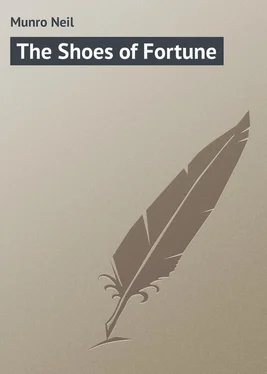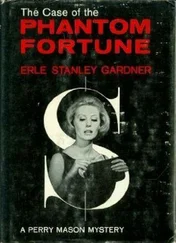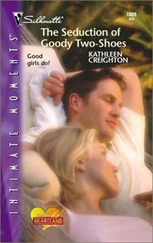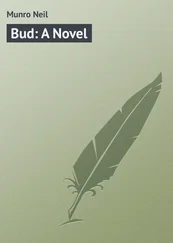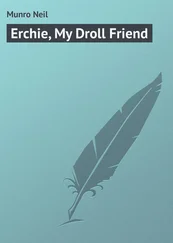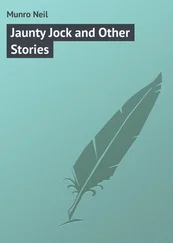Neil Munro - The Shoes of Fortune
Здесь есть возможность читать онлайн «Neil Munro - The Shoes of Fortune» — ознакомительный отрывок электронной книги совершенно бесплатно, а после прочтения отрывка купить полную версию. В некоторых случаях можно слушать аудио, скачать через торрент в формате fb2 и присутствует краткое содержание. ISBN: , Жанр: Прочие приключения, foreign_prose, на английском языке. Описание произведения, (предисловие) а так же отзывы посетителей доступны на портале библиотеки ЛибКат.
- Название:The Shoes of Fortune
- Автор:
- Жанр:
- Год:неизвестен
- ISBN:http://www.gutenberg.org/ebooks/43732
- Рейтинг книги:4 / 5. Голосов: 1
-
Избранное:Добавить в избранное
- Отзывы:
-
Ваша оценка:
- 80
- 1
- 2
- 3
- 4
- 5
The Shoes of Fortune: краткое содержание, описание и аннотация
Предлагаем к чтению аннотацию, описание, краткое содержание или предисловие (зависит от того, что написал сам автор книги «The Shoes of Fortune»). Если вы не нашли необходимую информацию о книге — напишите в комментариях, мы постараемся отыскать её.
The Shoes of Fortune — читать онлайн ознакомительный отрывок
Ниже представлен текст книги, разбитый по страницам. Система сохранения места последней прочитанной страницы, позволяет с удобством читать онлайн бесплатно книгу «The Shoes of Fortune», без необходимости каждый раз заново искать на чём Вы остановились. Поставьте закладку, и сможете в любой момент перейти на страницу, на которой закончили чтение.
Интервал:
Закладка:
The very thought of the fellow in that connection made me angry in her interest; and with a mischievous intention of spoiling his sport if he hovered, as I fancied, in the neighbourhood, or at least of delaying his happiness as long as I could, I kept the conversation going very blithe indeed.
She had a laugh, low and brief, and above all sincere, which is the great thing in laughter, that was more pleasant to hear than the sound of Earn in its tinkling hollow among the ferns: it surprised me that she should favour my studied and stupid jocosities with it so frequently. Here was appreciation! I took, in twenty minutes, a better conceit of myself, than the folks at home could have given me in the twelve months since I left the college, and I’ll swear to this date ‘twas the consciousness of my fancy shoes that put me in such good key.
She saw my glance to them at last complacently, and pretended herself to notice them for the first time.
She smiled – little hollows came near the corners of her lips; of a sudden I minded having once kissed Mistress Grant’s niece in a stair-head frolic in Glasgow High Street, and the experience had been pleasant enough.
“They’re very nice,” said Isobel.
“They’re all that,” said I, gazing boldly at her dimples. She flushed and drew in her lips.
“No, no!” I cried, ”’twas not them I was thinking of; but their neighbours. I never saw you had dimples before.”
At that she was redder than ever.
“I could not help that, Paul,” said she; “they have been always there, and you are getting very audacious. I was thinking of your new shoes.”
“How do you know they’re new?”
“I could tell,” said she, “by the sound of your footstep before you came in sight.”
“It might not have been my footstep,” said I, and at that she was taken back.
“That is true,” said she, hasty to correct herself. “I only thought it might be your footstep, as you are often this way.”
“It might as readily have been David Borland’s. I have seen him about here.” I watched her as closely as I dared: had her face changed, I would have felt it like a blow.
“Anyway, they’re very nice, your new shoes,” said she, with a marvellous composure that betrayed nothing.
“They were uncle’s legacy,” I explained, “and had travelled far in many ways about the world; far – and fast.”
“And still they don’t seem to be in such a hurry as your old ones,” said she, with a mischievous air. Then she hastened to cover what might seem a rudeness. “Indeed, they’re very handsome, Paul, and become you very much, and – and – and – ”
“They’re called the Shoes of Sorrow; that’s the name my uncle had for them,” said I, to help her to her own relief.
“Indeed, and I hope it may be no more than a by-name,” she said gravely.
The day had the first rumour of spring: green shoots thrust among the bare bushes on the river side, and the smell of new turned soil came from a field where a plough had been feiring; above us the sky was blue, in the north the land was pleasantly curved against silver clouds.
And one small bird began to pipe in a clump of willows, that showered a dust of gold upon us when the little breeze came among the branches. I looked at all and I looked at Isobel Fortune, so trim and bonny, and it seemed there and then good to be a man and my fortunes all to try.
“Sorrow here or sorrow there, Isobel,” I said, “they are the shoes to take me away sooner or later from Hazel Den.”
She caught my meaning with astounding quickness.
“Are you in earnest?” she asked soberly, and I thought she could not have been more vexed had it been David Borland.
“Another year of this.” said I, looking at the vacant land, “would break my heart.”
“Indeed, Paul, and I thought Earn-side was never so sweet as now,” said she, vexed like, as if she was defending a companion.
“That is true, too,” said I, smiling into the very depths of her large dark eyes, where I saw a pair of Spoiled Horns as plainly as if I looked in sunny weather into Linn of Earn. “That is true, too. I have never been better pleased with it than to-day. But what in the world’s to keep me? It’s all bye with the college – at which I’m but middling well pleased; it’s all bye with the law – for which thanks to Heaven! and, though they seem to think otherwise at Hazel Den House, I don’t believe I’ve the cut of a man to spend his life among rowting cattle and dour clay land.”
“I daresay not; it’s true,” said she stammeringly, with one fast glance that saw me from the buckles of my red shoes to the underlids of my eyes. For some reason or other she refused to look higher, and the distant landscape seemed to have charmed her after that. She drummed with a toe upon the path; she bit her nether lip; upon my word, the lass had tears at her eyes! I had, plainly, kept her long enough from her lover. “Well, it’s a fine evening; I must be going,” said I stupidly, making a show at parting, and an ugly sense of annoyance with David Borland stirring in my heart. “But it will rain before morning,” said she, making to go too, but always looking to the hump of Dungoyne that bars the way to the Hielands. “I think, after all, Master Paul, I liked the old shoon better than the new ones.”
“Do you say so?” I asked, astonished at the irrelevance that came rapidly from her lips, as if she must cry it out or choke. “And how comes that?”
“Just because – ” said she, and never a word more, like a woman, nor fair good-e’en nor fair good-day to ye, but off she went, and I was the stirk again.
I looked after her till she went out of sight, wondering what had been the cause of her tirravee. She fair ran at the last, as if eager to get out of my sight; and when she disappeared over the brae that rose from the river-side there was a sense of deprivation within me. I was clean gone in love and over the lugs in it with Isobel Fortune.
CHAPTER VI
MY DEED ON THE MOOR OF MEARNS
Next day I shot David Borland of the Driepps.
It was the seventh of March, the first day I heard the laverock that season, and it sang like to burst its heart above the spot where the lad fell with a cry among the rushes. It rose from somewhere in our neighbourhood, aspiring to the heavens, but chained to earth by its own song; and even yet I can recall the eerie influence of that strange conjunction of sin and song as I stood knee-deep in the tangle of the moor with the pistol smoking in my hand.
To go up to the victim of my jealousy as he lay ungainly on the ground, his writhing over, was an ordeal I could not face.
“Davie, Davie!” I cried to him over the thirty paces; but I got no reply from yon among the rushes. I tried to wet my cracking lips with a tongue like a cork, and “Davie, oh, Davie, are ye badly hurt?” I cried, in a voice I must have borrowed from ancient time when my forefathers fought with the forest terrors.
I listened and I better listened, but Borland still lay there at last, a thing insensate like a gangrel’s pack, and in all the dreary land there was nothing living but the laverock and me.
The bird was high – a spot upon the blue; his song, I am sure, was the song of his kind, that has charmed lovers in summer fields from old time – a melody rapturous, a message like the message of the evening star that God no more fondly loves than that small warbler in desert places – and yet there and then it deaved me like a cry from hell. No heavenly message had the lark for me: he flew aloft there into the invisible, to tell of this deed of mine among the rushes. Not God alone would hear him tell his story: they might hear it, I knew, in shepherds’ cots; they might hear it in an old house bowered dark among trees; the solitary witness of my crime might spread the hue and cry about the shire; already the law might be on the road for young Paul Greig.
Читать дальшеИнтервал:
Закладка:
Похожие книги на «The Shoes of Fortune»
Представляем Вашему вниманию похожие книги на «The Shoes of Fortune» списком для выбора. Мы отобрали схожую по названию и смыслу литературу в надежде предоставить читателям больше вариантов отыскать новые, интересные, ещё непрочитанные произведения.
Обсуждение, отзывы о книге «The Shoes of Fortune» и просто собственные мнения читателей. Оставьте ваши комментарии, напишите, что Вы думаете о произведении, его смысле или главных героях. Укажите что конкретно понравилось, а что нет, и почему Вы так считаете.
